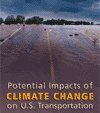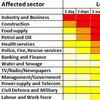 Many studies have already examined the potential impacts of climate change on broad sectors of the economy, such as agriculture and forestry, but only a handful have studied the impacts on transportation. Transportation professionals should look into the challenges posed by climate change and incorporate current scientific knowledge into the planning, design, construction, operation, and maintenance of transportation systems. Obviously, the primary focus of this study is on the consequences of climate change for U.S. transportation infrastructure and operations, but many – if not most – of the conclusion are just as applicable anywhere else in the world
Many studies have already examined the potential impacts of climate change on broad sectors of the economy, such as agriculture and forestry, but only a handful have studied the impacts on transportation. Transportation professionals should look into the challenges posed by climate change and incorporate current scientific knowledge into the planning, design, construction, operation, and maintenance of transportation systems. Obviously, the primary focus of this study is on the consequences of climate change for U.S. transportation infrastructure and operations, but many – if not most – of the conclusion are just as applicable anywhere else in the world
No exception
Every mode of transportation will be affected as climate change poses new and often unfamiliar challenges to infrastructure providers, as in China this winter.
A report from the US
Special Report 290: Potential Impacts of Climate Change on U.S. Transportation is the report from a study conducted by a committee of experts under the auspices of the Transportation Research Board and the Division on Earth and Life Studies of the National Research Council.
Potentially, the greatest impact of climate change on North America’s transportation system will be flooding of coastal roads, railways, transit systems, and runways because of a global rise in sea level coupled with storm surge and exacerbated in some locations by land subsidence. The vulnerability of transportation infrastructure to climate change, however, will extend well beyond coastal areas. Therefore, federal, state, and local governments, in collaboration with owners and operators of infrastructure such as ports and airports and private railroad and pipeline companies, should inventory critical transportation infrastructure to identify whether, when, and where projected climate changes in particular regions might be consequential.
The report makes the case that focusing on the problem now should help avoid costly future investments and disruptions to operations.
What should be done?
The primary focus of this study is on the consequences of climate change for U.S. transportation infrastructure and operations:
- Incorporate Climate Change into Investment Decisions
- Adopt Strategic, Risk-Based Approaches to Decision Making
- Improve Communication
- Integrate Evacuation Planning and Emergency Response into Transportation Operations
- Develop and Implement Monitoring Technologies
- Share Best Practices
- Reevaluate Design Standards
- Include Climate Change in Transportation and Land Use Planning
- Evaluate the National Flood Insurance Program and Flood Insurance Rate Maps
- Develop New Organizational Arrangements
After reading it I have to admit that many of the conclusion are just as applicable anywhere else in the world.
Downloads
- trb.org: Summary report (pdf)
- trb.org: Full report (pdf)
Links
- gaiawatch.wordpress.com: Getting around in a changing world
Related
- husdal.com: Economists versus Technocrats












